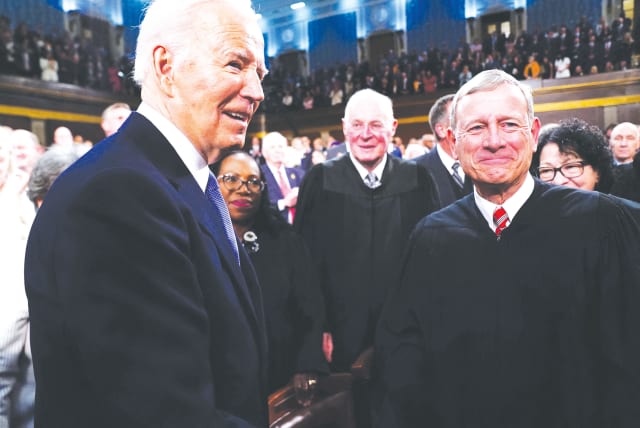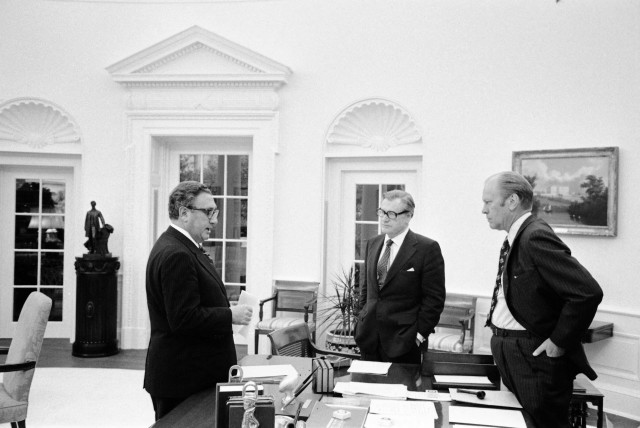Ethically bankrupt: The US needs to take a serious look at corrupt courts - opinion

The Congress and president must share blame for not demanding – and imposing, if necessary – higher standards on US courts.
This month we’ve witnessed how the Supreme Court can soar to great heights only to plunge deep into the political thicket. We marked the 70th anniversary of the landmark Brown v. Board of Education decision ending school segregation, a national goal still unfulfilled, and an angry and partisan justice reminded us of his role in the court’s status as a revered public institution has evaporated.
The unanimous 1954 desegregation ruling made chief justice Earl Warren the most influential justice of the 20th century. The president who nominated him, Dwight Eisenhower, wouldn’t agree. He thought the former California governor would be a reliable conservative. Instead, Warren, who turned out to be a liberal trailblazer, was “the biggest damn-fool mistake I ever made,” said Eisenhower.
Sometimes it goes the other direction. John F. Kennedy thought his old friend Byron “Whizzer” White was moderate-to-liberal, but he became a conservative and dissenting voice on many liberal issues, notably Roe v. Wade, Miranda and gay rights.
Violation of judicial ethics
Franklin D. Roosevelt chose senator Hugo Black, an Alabama conservative, to help mollify critics from the South. Black, a former KKK member, though FDR didn’t know it at the time, turned out to be an absolutist on the First Amendment, a staunch supporter of civil liberties, and an opponent of racial segregation.
On the other hand, presidents George H.W. Bush and George W. Bush appointed two of the most ethically challenged, partisan, and compromised justices, who in turn have done much to bring widespread contempt for the court. The flag should be flying upside down in front of the court as a sign of the distress caused by Justices Samuel Alito and Clarence Thomas.
Instead, it flew inverted in front of Alito’s home as a symbol of the January 6 “Stop the Steal” protests against Donald Trump’s defeat in the 2020 election. It was up for several days, between January 6 and Joe Biden’s inauguration, but news – and photographs – only became public recently.
Alito blamed his wife, saying he was out of town when she raised the flag because she was upset by a neighbor’s anti-Trump sign. That’s no excuse.
The New York Times, which broke the story, noted that “jurists and legal scholars said the display was a violation of judicial ethics, including the Supreme Court’s own guidelines, which emphasize the need to remain politically independent.”
Making matters worse, Alito has neither disapproved nor disavowed the incident at a time when he is sitting in on major court decisions about the 2020 election, the insurrection, and presidential immunity. Failure to recuse himself could taint the outcome of any one of the cases.
Thomas, Alito’s ethically compromised colleague, shares conflict of interest issues stemming from the insurrection, as well as an affinity for generous billionaires bearing gifts.
WIFE-BLAMING is another trait that they have in common with a disgraced Democratic senator and a disgraced former president.
New Jersey Senator Robert Menendez is on trial for bribery and corruption in a federal courthouse a few blocks from the state courtroom hosting Donald Trump’s hush money case. Menendez, caught with a stash of gold bars and pockets stuffed with cash allegedly for doing favors for foreign governments, blamed his wife (she will stand trial separately).
Trump insists the payoffs to a porn star were meant to avoid having his adultery embarrass his wife and had nothing to do with his election campaign.
The election cases are not the only ones in which Alito’s failure to recuse himself raises ethical questions. According to The New York Times, he accepted an invitation from a conservative billionaire to go on a luxury fishing vacation. A few months later, when the billionaire had a major tax case before the court, Alito rejected calls to recuse himself.
Both justices are “strongly identified not just with the Republican Party or the conservative movement but with the “Stop the Steal” movement,” said Cornell University law professor Michael C. Dorf, a former clerk to Justice Anthony Kennedy. The Washington Post columnist Ruth Marcus said Alito casts the “most predictably partisan” votes on this court.
Virginia “Ginni” Thomas, a longtime conservative political activist and Justice Thomas’s wife, was directly involved in attempts to overturn the election, including reaching out to White House chief of staff Mark Meadows to urge him to back Trump’s charges of election fraud. She also contacted Arizona state legislators to reverse Biden’s election.
It strains credulity when Virginia Thomas, who has worked with right-wing groups that have brought cases before the Supreme Court, says the couple don’t discuss his cases “until” the opinions go public.
Alito wrote the Dobbs decision striking the constitutional right to abortion. Thomas added that he would like to go further to “correct the error” of previous rulings that legalized the right to contraception, same-sex relationships, and same-sex marriage.
Thomas, who at 75 is the oldest member of the court, was nominated by Bush Sr. in 1991. He has a billionaire benefactor in Republican mega-donor Harlan Crow. ProPublica published a detailed investigation of the court’s ethical scandals, particularly the 20-year-plus Thomas-Crow Affair. There have been multiple cruises on Crow’s super yacht, trips on his private jet, socializing with Crow’s friends at his private resort, purchasing Thomas’s mother’s house for her to live in, and other gifts.
These ethically bankrupt and corrupt justices are also compromised by their links to the “Stop the Steal” movement. If they have any decency left they will recuse themselves from any 2020 election cases.
These are the most important politically-charged issues since the 2000 Bush v. Gore decision. It is not a question of ideology but integrity.
The court needs a serious code of ethics, not the toothless joke Chief Justice John Roberts produced last fall. The Brennan Center for Justice called that weak, self-policing, and “designed to fail.”
Roberts needs to look no further than the code the court already applies to its own employees and the rest of the judiciary.
The Roberts Court is badly wounded, and history will judge not just Alito and Thomas but the chief justice himself for tolerating the corruption of his brethren and not setting and enforcing high standards to protect the court’s integrity. And the Congress and president must share blame for not demanding – and imposing, if necessary – higher standards.
This is especially critical in this election year. We will be voting not only for a president’s policies but also for the people given lifetime appointments to the federal benches, where they will wield power long after that president and the next ones leave power.
At stake is nothing less than the American public’s confidence in the highest court in the land before it sinks further into a mire of its own making.
The writer is a Washington-based journalist, consultant, lobbyist, and former American Israel Public Affairs Committee legislative director.
Jerusalem Post Store
`; document.getElementById("linkPremium").innerHTML = cont; var divWithLink = document.getElementById("premium-link"); if (divWithLink !== null && divWithLink !== 'undefined') { divWithLink.style.border = "solid 1px #cb0f3e"; divWithLink.style.textAlign = "center"; divWithLink.style.marginBottom = "15px"; divWithLink.style.marginTop = "15px"; divWithLink.style.width = "100%"; divWithLink.style.backgroundColor = "#122952"; divWithLink.style.color = "#ffffff"; divWithLink.style.lineHeight = "1.5"; } } (function (v, i) { });

